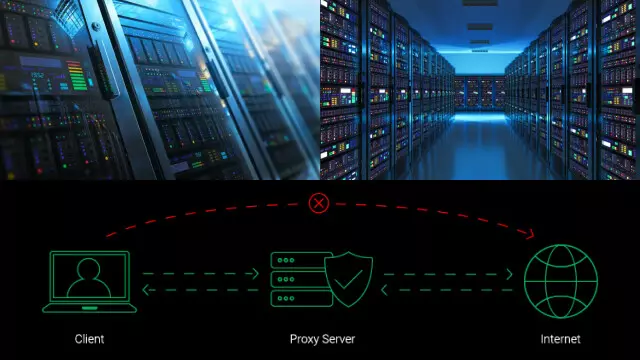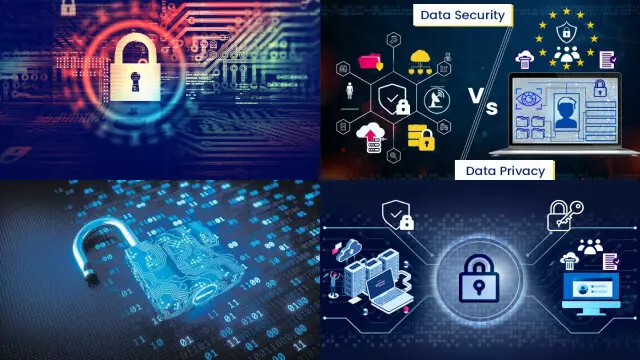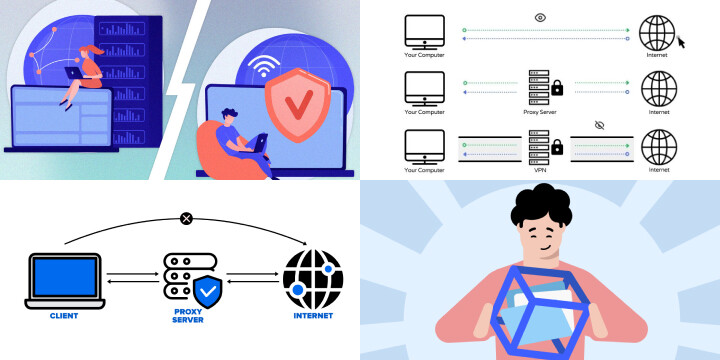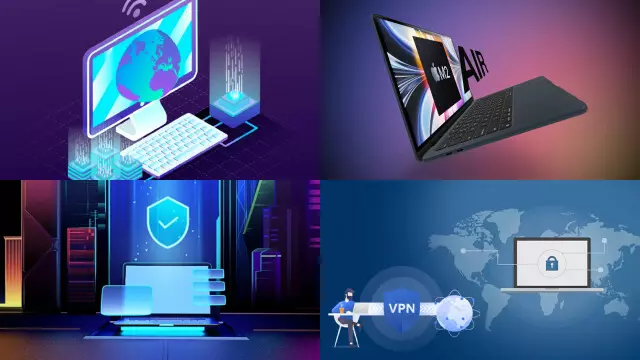Explaining the Basics of Proxies and VPNs
Proxies and VPNs are two of the most commonly used tools for internet privacy and security. Proxies act as intermediaries between a user and the internet, hiding the user’s IP address and allowing them to access restricted websites. VPNs, on the other hand, provide a secure and encrypted connection to the internet, protecting users from prying eyes and keeping their online activities private.
While both proxies and VPNs have their own unique features and benefits, it’s important to understand the basics of each tool in order to make an informed decision on which one is best suited for your needs. Whether you’re looking to bypass geo-restrictions, protect your online identity, or simply maintain your privacy, both proxies and VPNs can provide the solution you need.
What is a Proxy Server?
A proxy server is a computer system or an application that acts as an intermediary between a client and a server. When a user makes a request to access a website, the request is sent to the proxy server instead of directly to the website. The proxy server then makes the request to the website on behalf of the user, and the website’s response is sent back to the proxy, which in turn sends it to the user. This process allows the proxy server to hide the user’s IP address and other identifying information, making it easier for the user to access restricted websites and protect their privacy and security online. There are different types of proxy servers, including web proxies, SOCKS proxies, and reverse proxies, each with its own specific use case and set of benefits. Understanding the basics of proxy servers is an important step towards enhancing your online privacy and security.
What is a VPN?
A VPN, or Virtual Private Network, is a tool that allows users to securely connect to the internet from anywhere in the world. When a user connects to a VPN, their internet traffic is encrypted and redirected through a server operated by the VPN provider. This creates a secure and encrypted “tunnel” between the user’s device and the internet, protecting their online activities from prying eyes and keeping their personal information private. VPNs also hide the user’s IP address, allowing them to access restricted websites and content, and bypass geo-restrictions. Whether you’re using a public Wi-Fi network, working from home, or traveling, a VPN can provide the privacy and security you need to protect your online activities and personal information. Understanding the basics of VPNs and how they work is an important step towards keeping your online activities secure and private.
Comparison of Proxies and VPNs: Key Differences
Proxies and VPNs both provide online privacy and security, but there are key differences between the two technologies. A proxy server acts as an intermediary between a user’s device and the internet, masking the user’s IP address and allowing them to access restricted content. However, a proxy does not encrypt the user’s internet traffic, making it less secure. A VPN, on the other hand, encrypts all internet traffic and routes it through a remote server, providing a higher level of privacy and security.
VPNs also hide the user’s IP address, making it more difficult for governments, internet service providers, and others to track their online activities. Additionally, VPNs can be used on a wider range of devices and provide access to a wider range of content and services compared to proxies. When it comes to privacy and security, a VPN is the better choice, but proxies can be useful for accessing restricted content in certain situations. Understanding the differences between proxies and VPNs is essential for making an informed decision about which tool is right for your online privacy and security needs.
Security and Privacy Differences Between Proxies and VPNs
When it comes to online security and privacy, proxies and VPNs offer different levels of protection. Proxies can be used to bypass geographical restrictions and access restricted websites, but they do not encrypt user traffic, leaving it vulnerable to interception by hackers and other malicious actors. Furthermore, since proxies only hide the user’s IP address, they do not provide the same level of anonymity as a VPN. On the other hand, VPNs encrypt all internet traffic and route it through a remote server, offering a higher level of security and privacy. By hiding the user’s IP address and encrypting their internet traffic, VPNs make it much more difficult for anyone to track the user’s online activities. While both proxies and VPNs offer some level of security and privacy, for the best protection, a VPN is the preferred option. It’s important to understand the differences between proxies and VPNs so you can make an informed decision about which tool is best for your online security and privacy needs.
Speed and Performance Differences Between Proxies and VPNs
The speed and performance of proxies and VPNs can vary greatly depending on various factors such as the server location, the number of users on the server, and the strong encryption protocols used. Proxies, being simpler in design, tend to have faster connection speeds as they do not encrypt traffic, making it lighter on the network.
However, due to the limited protection offered by proxies, they are not ideal for use with sensitive data or activities. VPNs, on the other hand, encrypt all internet traffic, making it more secure but also slower due to the overhead of encryption. The speed of a VPN connection can also be affected by the server location and the distance from the user’s location. It’s important to choose a VPN provider that offers fast and reliable servers, as well as a variety of protocols, to ensure good speed and performance. In general, for the best balance of speed and security, a VPN is the better option.
Hybrid Solutions: Combining the Strengths of Proxies and VPNs for Enhanced Online Security
In the realm of online security, leveraging hybrid solutions that combine the strengths of both proxies and Virtual Private Networks (VPNs) is emerging as a comprehensive approach to fortify digital privacy and protection.
Proxies excel in providing anonymity by acting as intermediaries between a user’s device and the internet. They route internet traffic through their servers, masking the user’s IP address. This can be particularly advantageous when specific geographical locations need to be simulated. By integrating proxies into a hybrid solution, users can selectively route certain traffic through proxy servers, optimizing performance and flexibility.
VPNs, on the other hand, offer robust encryption, making them instrumental in securing data during transmission. Combining the encryption prowess of VPNs with the anonymity features of proxies creates a multifaceted defense against various online threats. Users benefit from not only obscured IP addresses but also encrypted data, shielding sensitive information from potential eavesdroppers.
A hybrid solution allows users to tailor their security approach based on specific needs. For instance, sensitive financial transactions might be channeled through the encryption-focused VPN, while general web browsing could utilize the anonymity of a proxy.
However, it’s crucial to choose reliable and reputable services to ensure the effectiveness of the hybrid solution. By merging the advantages of both proxies and VPNs, users can navigate the digital landscape with enhanced security, striking a balance between anonymity, encryption, and performance.
Conclusion: Deciding Between a Proxy or a VPN
In conclusion, the decision to use a proxy or a VPN depends on the specific needs and requirements of the user. Proxies are useful for tasks that do not require high levels of security or privacy, such as bypassing website restrictions or hiding your IP address. However, they offer limited protection and are not suitable for sensitive activities such as online banking or communication.
VPNs, on the other hand, provide robust security and privacy features and are ideal for users who want to keep their online activities protected. They offer fast and encrypted connections, making them a great choice for both personal and professional use. When choosing between a proxy and a VPN, it’s important to consider factors such as speed, security, privacy, and cost to make an informed decision that best suits your needs.
Frequently Asked Questions About Proxies and VPNs
1. What is the main difference between a proxy and a VPN?
A proxy server acts as an intermediary between your device and the internet, while a VPN encrypts your internet connection and hides your IP address.
2. Is a proxy or VPN better for security and privacy?
VPNs offer better security and privacy than proxies as they encrypt all internet traffic and protect your online identity.
3. Can a proxy or VPN be used for illegal activities?
No, both proxies and VPNs can be used for illegal activities. It is important to follow the laws of your country and use them responsibly.
4. Can a proxy or VPN be blocked by websites?
Yes, websites can block both proxies and VPNs. It is important to use a high-quality service to avoid being detected.
5. Can a VPN slow down my internet connection?
Yes, using a VPN can slow down your internet connection, but it depends on the quality of the VPN service you use. Some VPNs are optimized for speed and can have minimal impact on your internet speed.




